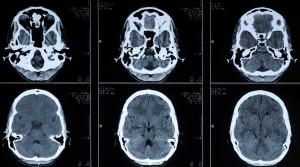
The Brain and CT Scans
 The brain is perhaps the most complex and delicate organ in the human body. As has been discussed extensively on this blog, traumatic brain injuries are some of the most common, and dangerous, outcomes caused by automobile crashes.
The brain is perhaps the most complex and delicate organ in the human body. As has been discussed extensively on this blog, traumatic brain injuries are some of the most common, and dangerous, outcomes caused by automobile crashes.
THE BRAIN
As many of us know, the brain is a vital organ which controls thought, memory, emotion, touch motor skills, vision, respirations, temperature, hunger, and every process that regulates our body. The brain can be divided into three parts:
- the Cerebrum which controls initiation of movement, coordination of movement, temperature, touch, vision, hearing, judgment, reasoning, problem solving, emotions and learning;
- the Brainstem which controls movement of the eyes and mouth, relaying sensory messages, hunger, respirations, consciousness, cardiac function, body temperature, involuntary muscle movements, sneezing, coughing, vomiting, and swallowing; and
- the Cerebellum which coordinates voluntary muscle movements, and maintains posture, balance and equilibrium.
When a crash victim has sustained a traumatic brain injury, doctors must use diagnostic tests to be able to assess the damage and craft a plan moving forward. In these situations, doctors will have the patient undergo a CT or CAT scan, in much the same way doctors with back pain or extremity pain will undergo an MRI or x-ray.
CT SCAN OF THE BRAIN
Computed tomography (CT or CAT scan) is a noninvasive diagnostic imaging procedure that combines x-rays taken from many different angles and computer technology to produce cross-sectional images (often called slices) of the brain. The resulting images can be viewed individually to allow a physician to see what is going on within the organ at any level. A doctor can look at each of these slices individually or perform additional visualization to view your brain from different angles. In some cases, CT images can be combined to create 3-D images.
A CT scan of the brain is often performed in the situations where x-rays of examination are not conclusive. They can assess the brain for tumors and other lesions, injuries, intracranial bleeding, structural anomalies, infections, brain function or other conditions. Brain surgeons will often use CT scans to provide guidance for brain surgery or biopsies of brain tissue.
IF YOU HAVE SUFFERED AN INJURY
If you or a loved one has suffered a Traumatic Brain Injury due to the negligence of another and, it is well advised to contact a licensed Florida Attorney. Once the initial diagnosis and prognosis for recovery are established by your physician, it is important to consult with an experienced traumatic brain injury attorney to determine if the injury was due to someone else’s negligence, whether the injury occurred in a car or motorcycle accident, or during a sporting event. The attorneys at Dolman Law Group are committed to understanding the medical nuances of traumatic brain injury so that they can procure just compensation for victims. If we can assist you with a free case evaluation and consultation regarding a traumatic brain injury, please call us at 727-451-6900.
Dolman Law Group
800 North Belcher Road
Clearwater, FL 33765
http://www.dolmanlaw.com/practice-area/brain-injury/
Content written by Attorney Matthew Dolman. Content creation by Jordan Monarrez Puckett.
Google+




